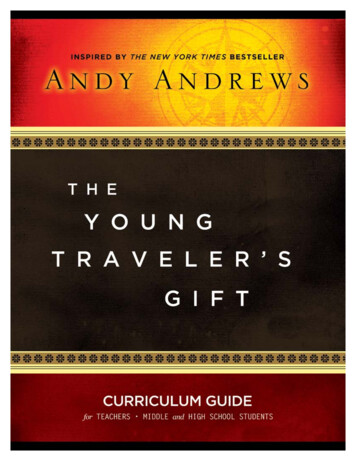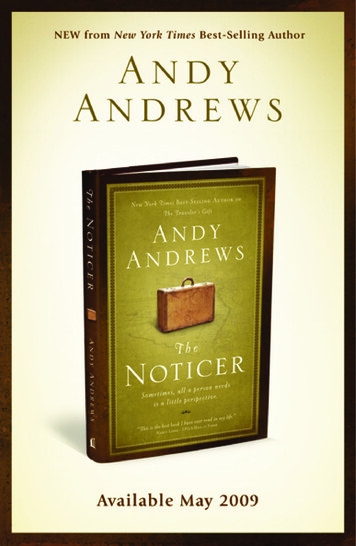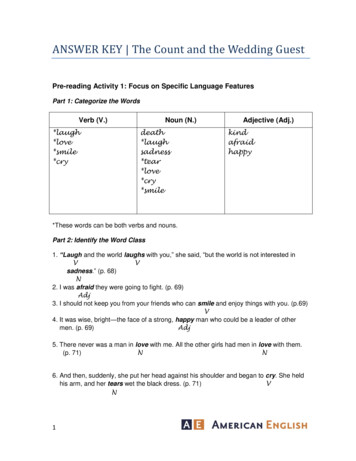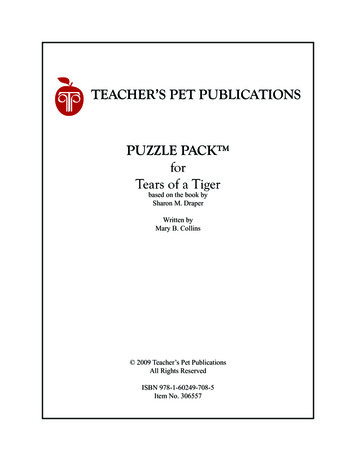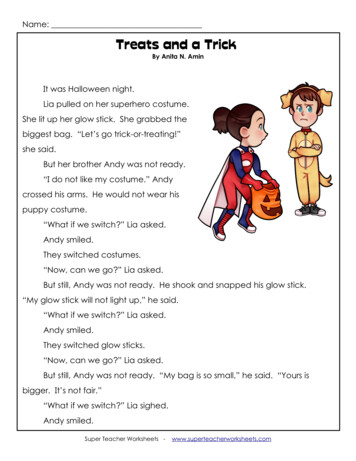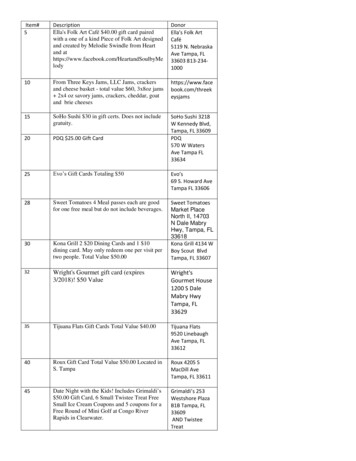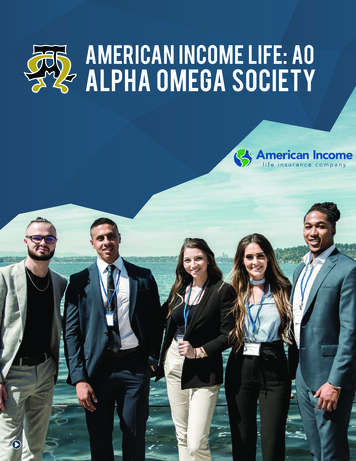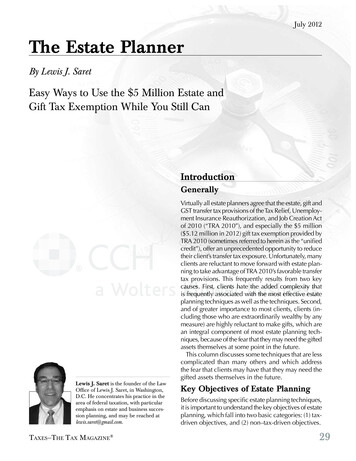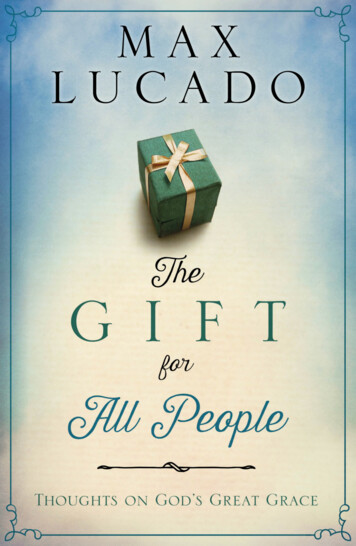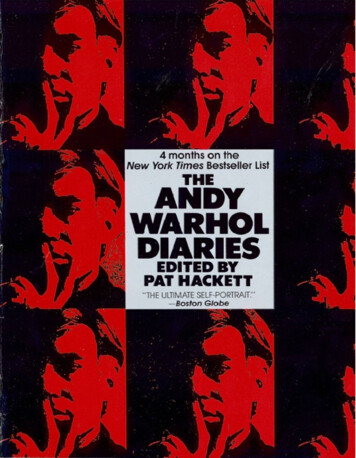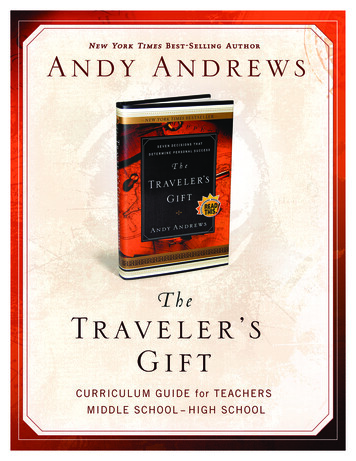
Transcription
Th eTraveler’sGiftSEVEN D E C I S I O N S T H A T D E T E R M I N E P E R S O N A L S U C C E S SbyAndy AndrewsCurriculum Guide for TeachersMiddle School — High SchoolIncluding Student Reproducible PagesWritten byPeggy Hoekenga, MEdEdited byWill Hoekenga, SixWordsStudio.comLayout and Design byKevin Burr, OcularInk.comLightning Crown Publishers, Inc.P.O. Box 17321 Nashville, TN 372171-800-726-2639www.AndyAndrews.com 2010 Lightning Crown Publishers, Inc.All content owned by Lightning Crown Publishers, Inc. All rights reserved.Portions of the work may be reproduced and distributed for educational purposes only.
About the Curriculum Guide AuthorTheTraveler’s GiftAbout the Curriculum Guide AuthorPeggy Hoekenga is an assistant professor at the University of North Alabama, where she taught first grade atKilby Laboratory School for seven years and is currently beginning her fifth year as the Alabama Reading Initiative reading coach for grades K-6. She received her Master’s Degree in Early Childhood Education from theUniversity of Mississippi. In 2008, the Northwest Alabama Reading Council selected her as Reading Teacher ofthe Year. She currently lives in Florence, AL, with her husband of 34 years, Paul.Andy AndrewsPage 3
Table of ContentsTheTraveler’s GiftTable of ContentsSummary.p. 5About the Author.p. 6Before Reading Activities.p. 7Build Background Knowledge.p. 7Set Purpose for Reading.p. 8Introduce Vocabulary.p. 13Vocabulary and Word Study Activities for Grades 6-8.p. 16-23Vocabulary and Word Study Activities for Grades 9-12.p. 24-28During Reading.p. 29Comprehension Questions.p. 29-36After Reading Activities.p. 37Enrichment/Extend the Learning.p. 37-41Vocabulary Quizzes.p. 42-45Book Test.p. 46-49Quiz and Test Answer Keys.p. 50Andy AndrewsPage 4
SummaryTheTraveler’s GiftSummaryForty-six-year-old David Ponder feels like a total failure. Once a high-flying executive in a Fortune 500 company,he now works a part-time, minimum wage job. His wife makes more money than he does by cleaning houses,and he drives an old car with a mismatched fender and a heater that no longer works.Then an even greater crisis hits: his daughter becomes ill, and he can’t afford to get her the medical help sheneeds. When his car skids on an icy road, he wonders if he even cares to survive the crash.But an extraordinary experience awaits David Ponder. He finds himself traveling back in time, meeting leadersand heroes at crucial moments in their lives. From the European theater of World War II to an ancient MiddleEastern king’s throne room, from a Civil War battlefield to a warehouse in heaven, David encounters some ofthe wisest people who ever lived. Abraham Lincoln, King Solomon, Anne Frank, Harry Truman, and others teachhim unforgettable life lessons. By the time his journey is over, he has received seven secrets for success—and asecond chance to create a life worth living, no matter what opposition or obstacles he might face.The Traveler’s Gift offers a modern day parable of one man’s choices—and the attitudes that make the differencebetween success and failure.Andy AndrewsPage 5
About the AuthorTheTraveler’s GiftAbout the AuthorHailed by a New York Times writer as “someone who has quietly become one of the most influential people inAmerica,” ANDY ANDREWS is the author of New York Times Bestsellers The Noticer and The Traveler’s Gift,and is also an in-demand speaker for the world’s largest organizations. The Noticer and The Traveler’s Gift werefeatured selections of ABC’s Good Morning America, have been translated into nearly 20 languages, and continue to appear on bestseller lists around the world.Andy has spoken at the request of four different United States presidents and toured military bases around theworld, being called upon by the Department of Defense to speak about the principles contained in his books. Arguably, there is no single person on the planet better at weaving subtle yet life-changing lessons into riveting talesof adventure and intrigue—both on paper and on stage.He lives in Orange Beach, Alabama, with his wife, Polly, and their two sons.Andy AndrewsPage 6
Before Reading ActivitiesTheTraveler’s GiftBefore Reading ActivitiesBuild Background KnowledgeAsk your students the following questions: Have you ever wished that you could talk with a famous person from the past? What questions would you ask them?Have students participate in a “quick write.” They will write down the person from history whom they would mostlike to talk to and then they will write down as many questions to ask their famous person as possible. Studentsmust write as quickly as they can, because they will only have two minutes in which to write.After students write for two minutes, have everyone stop. Then, have students share with their neighbor or insmall groups what they have written down. Give students two to three minutes for discussion. While studentsare still in groups, ask them to discuss this next question: What things can you learn from the famous historical figures you chose and how could they influence us today?Give students two to three minutes to discuss their answers with each other. Then, have one student from eachgroup report what they have discussed.Andy AndrewsPage 7
Before Reading ActivitiesTheTraveler’s GiftSet Purpose for ReadingChoose one of the following to set the purpose for reading: 1 T ell students they will be reading a book about a man who learns several valuable life lessons from people inthe past. Ask them to make a list of each lesson as they read, using the graphic organizer on p. 9 and 10. 2 F ill a small suitcase with the following items: a copy of the Gettysburg address a notecard with “The Buck Stops Here” written on it a diary a picture of a Union Soldier a Bible a pink rose a crown a Star of David a world map a copy of the Presidential Seal a small globeHave students list these items on their graphic organizer. Then, as they read the story, they should figure outwith whom these items are associated. Some items might be readily identified with more than one character,and some characters may be identified with more than one item. As they list the items, have them explain whythey’ve chosen the item(s) to go with each character. They may use the Graphic Organizer on p. 11. how students the front of the book and read the title to them. Ask students to make predictions about3 Sthe traveler’s identity and what the traveler’s gift might be. They may also predict where they think thetraveler might be going and what he/she will do when they get there.Andy AndrewsPage 8
Before Reading ActivitiesTheTraveler’s GiftGraphic Organizers for Before Reading ActivitiesSeven Life Lessons Learned from Famous Historical FiguresDirections: Complete the Graphic Organizer as you read about each famous person that David Ponder encountered in his travels. Include the place and time period for the meeting (i.e. 1863, Gettysburg, PA). Then,in your own words, give a brief summary of the lesson that David learned.Person:Period and Location in History:Lesson Learned:Person:Period and Location in History:Lesson Learned:Person:Period and Location in History:Lesson Learned:Andy AndrewsPage 9
Before Reading ActivitiesTheTraveler’s GiftPerson:Period and Location in History:Lesson Learned:Person:Period and Location in History:Lesson Learned:Person:Period and Location in History:Lesson Learned:Person:Period and Location in History:Lesson Learned:Andy AndrewsPage 10
Before Reading ActivitiesTheTraveler’s GiftWhat’s in the Traveler’s Suitcase?Seven Life Lessons Learned from Famous Historical FiguresDirections: List the items that were found in the suitcase in the box below. As you read, list the character theitem or items signify. Some items may be suitable for more than one character. Briefly explain why the item oritems might represent that particular character.Contents of Suitcase:1. Character:Item(s):What is the relationship of the item(s) to that person?2. Character:Item(s):What is the relationship of the item(s) to that person?3. Character:Item(s):What is the relationship of the item(s) to that person?Andy AndrewsPage 11
Before Reading ActivitiesTheTraveler’s Gift4. Character:Item(s):What is the relationship of the item(s) to that person?5. Character:Item(s):What is the relationship of the item(s) to that person?6. Character:Item(s):What is the relationship of the item(s) to that person?7. Character:Item(s):What is the relationship of the item(s) to that person?Andy AndrewsPage 12
Before Reading ActivitiesTheTraveler’s GiftIntroduce VocabularyThe vocabulary should be introduced prior to reading. The words are listed by chapters below, and on thepages that follow. Determine how many chapters you will assign to your students and then introduce the corresponding vocabulary. You may choose all the words in each section, or select the ones that best suit the ages,needs, and knowledge-base of your students.Vocabulary activities are on the pages following the vocabulary lists. These activities have been divided intograde-level lists, but you may wish to use activities from both lists based on the abilities and interests of yourparticular students.Chapters 1 & 2devastating (p. 1)feverishly (p. 3)conglomerate (p. 3)stopgap (p. 4)résumés (p. 4)immersed (p. 4)severance (p. 7)incredulous (p. 13)Chapter 3ornate (p. 17)warily (p. 29)endure (p. 30)platoon (p. 30)adversity (p. 34)Chapter 4jostling (p. 35)pungent (p. 36)elaborate (p. 36)maneuvered (p. 37)vantage (p. 37)fundamentals (p. 47)Andy Andrewsawe-inspiring (p. 37)Page 13
Before Reading ActivitiesTheTraveler’s GiftChapter 5trance (p. 54)complement (p. 54)myriad (p. 58)projectile (p. 60)flank (p. 60-65)rhetoric (p. 63)stoic (p. 67)mediocrity (p. 70)Chapter 6gingerly (p. 74)pronounced (p. 77)financiers (p. 80)convictions (p. 80)contingent (p. 83)refrain (p. 84)gambit (p. 84)insolence (p. 85)Chapter 7resolutely (p. 94)annex (p. 97)mimic (p. 102)convey (p. 100)murmuring (p. 107)Chapter 8tentatively (p. 112)orator (p. 113)enthralled (p. 113)disheveled (p. 117)propensity (p. 119)enlightening (p. 122)honing (p. 122)transfixed (p. 124)rivulets (p. 127)Andy Andrewsvilified (p. 129)dastardly (p. 131)Page 14
Before Reading ActivitiesTheTraveler’s GiftChapter 9peripheral (p. 143)perpetual (p. 149)diverted (p. 150)agonized (p. 153)renders (p. 154)flayed (p. 155)calamity (p. 159)dissolution (p. 159)metallurgy (p. 160)precipice (p. 162)peril (p. 162)Chapters 10 & 11astonishment (p. 170)argon (p. 171)edifice (p. 171)precariously (p. 173)suppress (p. 175)vantage (p. 177)ovation (p. 179)duress (p. 180)legacy (p. 180)bead (p. 189)illusion (p. 190)vaguely (p. 195)Andy AndrewsPage 15
Before Reading ActivitiesVocabulary ActivitiesTheTraveler’s GiftFor Grades 6-81 Use the Word Sort Graphic Organizer on page 17 so that students can identify the parts of speech for the vocabulary words that you select. You may want to include the page numbers where the words arefound if you use words from multiple chapters. 2 Students continue to get confused when asked to spell words with inflectional endings. They aren’t sureif they need to double the final consonant, drop e, change y to i, or if the base word stays the same. Ifyou have students who are having trouble with this skill, then have them sort the vocabulary words withinflectional endings using the sorting activity on page 18.3Have students define the vocabulary words that you select using the graphic organizers on page 21. 4 Have students write the vocabulary words that have prefixes and/or suffixes. Then, they should write thebase word for each of these words. Next, they should write as many other forms of the word as possibleby adding different prefixes and/or suffixes. They can use their own paper or the grid on page 22. Youmay want to provide the students with a Prefix and Suffix Word Bank. If so, there is one on the page following the graphic organizer, but don’t limit them to the word banks. 5 Have students write a short story or a poem using all the vocabulary words from one or two chapters.Andy AndrewsPage 16
Before Reading ActivitiesTheTraveler’s GiftNameVocabulary Word SortParts of SpeechNounVerbAdjectiveAdverbMore than One****Find the words that can be used as multiple parts of speech. Then, locate the word in the text and indicate which part of speech itis in the book.WordAndy AndrewsPage Number in BookPart of speech as used in textPage 17
Before Reading ActivitiesTheTraveler’s GiftNameInflectional Endings Word ns for use:Students should cut out the above words and write the base word for each word in the first column of their blankgrid (following page). Next, they should sort and glue them into the appropriate column on the blank grid. If youhave students who are struggling readers and spellers, manipulating the words will be most helpful for them.When they finish sorting and gluing them in the correct column, you may also want to have them follow up bymaking their own grid and writing the words on another sheet of paper, exactly as they have them sorted. Youmight even want them to conduct a word search in other reading materials for words with inflectional endings,and add them where they would belong in the sort. For students who don’t need as much practice, or to conserve paper, teachers might choose to post the vocabulary words and have students do a writing sort with thewords, simply writing them in the appropriate column on their sheet.When students have completed the sorting, ask them if there are any generalizations that they can make about whento drop e, make no changes, etc. This helps them form their own rules about when to make these changes andmakes it more likely they will remember them, as opposed to you giving them the rules and exceptions to rules.Andy AndrewsPage 18
Before Reading ActivitiesTheTraveler’s GiftVocabulary ActivitiesBase WordAndy Andrewse dropChange y to iNo changePage 19
Before Reading ActivitiesTheTraveler’s GiftVocabulary Word SortAnswer Keyfor Inflectional Word EndingsSort Vocabulary Word Graphic OrganizerBase Worde inginspireawe-inspiringChange y to imaneuverpronounceNo xtransfixedvilifyvilifieddivertagonizeflayAndy AndrewsdivertedagonizedflayedPage 20
Before Reading ActivitiesTheTraveler’s GiftNameVocabulary Word Graphic OrganizerWord:Short Definition (in your own words):SynonymsAntonyms1.1.2.2.Visual representation of the word. How would you illustrate this word?Use the word in a sentence.Andy AndrewsPage 21
Before Reading ActivitiesTheTraveler’s GiftHow Many Words Can You Create?Choose a vocabulary word that has a prefix and/or a suffix. Then, identify the base word in the word. How manynew words can you create by adding different prefixes and/or suffixes to the base word?Vocabulary WordBase WordVocabulary WordBase WordVocabulary WordBase WordVocabulary WordBase WordNew Words:New Words:New Words:New Words:Andy AndrewsPage 22
Before Reading ActivitiesTheTraveler’s GiftWord BanksCommon PrefixesPrefixMeaninganti-againstdis-not, oppositein-, im-inmis-not, wronglynon-notpre-beforere-againun-notCommon SuffixesSuffixMeaning-able, -iblecan be done-enmade of-ercompare t wo things-estcompare more than t wo things-fulfull of-lylike (adverb)-mentaction of process-nesscondition of-ylike (adjective)Andy AndrewsPage 23
Before Reading ActivitiesVocabulary ActivitiesTheTraveler’s GiftFor Grades 9-121 Have students locate the vocabulary words that you have chosen from the suggested vocabulary lists in the text. Then, have them write the sentence where they appear in the text and compose a definition forthe word based on context clues and their current knowledge. Students can use the graphic organizeron page 26 to complete this activity. ou can differentiate the vocabulary lists by allowing students to choose their own words. They would2 Ychoose the words that are new to them, or words that they already know, but are used in a differentcontext in this book. They should make a list of the words and then locate their meanings in a dictionary.They can use the graphic organizer on page 27. tudents can identify the parts of speech of each vocabulary word. For words that have multiple mean3 Sings and uses, they can indicate how they are used in the text. They can use the graphic organizer onpage 17 to write their answers as they sort the words in the proper category. (The same “VocabularyWord Sort Parts of Speech” grid from the Grades 6-8 Section.) ssign the vocabulary words from one, two, or several chapters, and allow students to use them to write4 Aa poem, song, or newspaper article about those chapters. 5 I dentify the Greek/Latin roots from the following vocabulary words: awe-inspiring (spir), projectile (ject),resolutely (solv), and dissolution (solu). Then, have the students use the charts on page 28 to build newwords. The more exposure we can give our students to affixes and root word meanings, the better prepared they will be to decode unfamiliar words and their meanings. This will be an asset for them whenthey must take SATs, ACTs, and other standardized tests.Andy AndrewsPage 24
Before Reading ActivitiesTheTraveler’s Gift6 Have students locate the base word in words that have prefixes, suffixes, and/or inflectional endings. Then, have them indicate the language of origin of the base word and its meaning. Next, have them listall the words they could make with the same base word by using different prefixes, suffixes, and inflectional endings.7 D ownload the “Concept of Definition” graphic organizer from www.readingquest.org/strat/cdmap.htmlfor students to use to gain a better understanding of the most difficult vocabulary words.Andy AndrewsPage 25
Before Reading ActivitiesTheTraveler’s GiftVocabulary Word Definitions Using context cluesWord:Page # found in text:Sentence used from text:Your definition based on context clues:Word:Page # found in text:Sentence used from text:Your definition based on context clues:Word:Page # found in text:Sentence used from text:Your definition based on context clues:Andy AndrewsPage 26
Before Reading ActivitiesTheTraveler’s GiftVocabulary Word Graphic OrganizerWord:Definition:Synonym:Antonym:Source of definition:Word:Definition:Synonym:Antonym:Source of definition:Word:Definition:Synonym:Antonym:Source of definition:Word:Definition:Synonym:Antonym:Source of definition:Andy AndrewsPage 27
Before Reading ActivitiesTheTraveler’s GiftBuilding with Affixes and RootsDefine the vocabulary words below. Then identify the Greek or Latin root in each word and the meaning of theroot. Next, use the root words from each of the words to build more words with the affixes that surround theroots in the boxes below the words. You may use more than one affix in a word.WordDefinitionRootRoot ionretionabAndy Andrewspersolv/soludisatePage 28
During Reading ActivitiesTheTraveler’s GiftDuring Reading ActivitiesQuestions for Discussion and ComprehensionChapter One1. Why did David miss Jenny’s birthday? (He was too busy at work. He worked all the time.) If you wereJenny, how would you feel about Dad “forgetting” your birthday? (Accept any reasonable answers)2. Read the following from page 6, “But his work at the plant, while it did provide a living, never seemed to provide a life.” Explain what the author meant by this statement. (Students’ answers might include: he didn’thave much of a life because he worked all the time; his work was his life; he was so busy working that hemissed out on living; he missed all the important events in the life of his daughter and wife, etc.)Chapter Two1. Again, David mentions not having a purpose. He has a wife and a child. Why do you think he feels as if hehas no purpose? (Accept any reasonable answers. They should include statements like: he doesn’t spendany time with his family, so he has no personal attachment to them; working provides money to live, but itcan’t be your only purpose in life; people need to make emotional attachments to feel they have a purpose )2. Do you think David wrecked his car on purpose? Why or why not? (Accept any reasonable answers)3. After reading these first two chapters, what conclusions can you draw about Jenny and David? What kind ofpeople are they? Write a description of the two main characters, David and Jenny. (This can be done usinga compare/contrast T chart, Venn diagram, or students can write a narrative-style description.)4. What do you think will happen next? (Accept any reasonable answers)Andy AndrewsPage 29
During Reading ActivitiesTheTraveler’s GiftChapter Three1. Where is David when he wakes up? Describe the setting in great detail. (He is in a second floor room of abuilding and he’s sitting on a large Persian rug in a very ornate room. The room has high ceilings. There isa globe in the room and a chair with a back made of mahogany wood. There’s a man across the room fromhim who is sorting papers. It is hot and humid in the room. The location is Potsdam, Germany, and it isTuesday, July 24, 1945.)2. Whom does David meet? (Harry Truman) Is David dreaming? Explain your answer. (Answers will vary,some students may include some of the language from page 22.)3. On page 25, it says, “The ultimate outcome of anyone’s life is a matter of personal choice.” Do you agreewith this? Why or why not? (Answers will vary)4. In this chapter, we learn that the first decision for success is, “The buck stops here.” Explain what thismeans in your own words. Can you apply this to your life today? How? (Accept any reasonable answers,but their explanation should include something about taking responsibility for your problems and the actionsyou take, or that each person is responsible for their past, present, and future successes )5. So often in life, people try to blame others for their own misfortune and/or mistakes. Have you ever said, “It’s notmy fault”? Why do we say this? Why do we try to put the blame on others? (Accept any reasonable answers)Chapter Four1. Describe the setting at the beginning of Chapter 4. How is it different or similar to the setting in Chapter 3?Use a Venn diagram to compare and contrast the settings in these two chapters. (Chapter 4 setting description: Very large room filled with people, smells of cedar, marble flooring. There were huge columns supportingthe ceiling, a large, loud gong was sounding. In the room, there was a throne made of ivory with gold etchings.There were huge statues of lions in the room. In comparing and contrasting the two settings: Same—Large,ornate rooms, not in America Different—Locations, number of people in rooms, time period, )Andy AndrewsPage 30
During Reading ActivitiesTheTraveler’s Gift2. What special ability had David Ponder acquired on his journey? (He was able to speak or communicate in various languages and comprehend them as well)3. Who did David meet this time? How did this person describe wisdom? (He met King Solomon. He said thatwisdom was a gift that could not be bought. It is something that you have to look for and that it can’t be foundby just anybody. He said wisdom enables you to be content and successful.)4. How does a person seek wisdom? (Answers will vary)5. What concerns did David express about his daughter’s choice of friends? (He was worried about the effects theyhave on her, both good and bad. He knows her friends can influence her decisions, behavior, and attitudes. Theycan even influence the clothes she wears!) Do you agree or disagree with this? Why? (Answers will vary)6. What role does wisdom play in choosing your friends? Why should you choose your friends carefully andwisely? Give some examples. (Accept any reasonable answers)Chapter Five1. The next encounter finds David right smack in the middle of a famous Civil War battle, speaking to a Colonelwhom he had never heard of, Joshua Chamberlain. Where were they and how did Chamberlain explain theirreason for being there? (Gettysburg, PA – He thought it wouldn’t last long and that it would be fun. It was hispatriotic duty and the right thing to do. He did it to give others their freedom )2. What did Chamberlain say was his greatest advantage in this battle? (The fact that he was stubborn and thathe would never give up or run away, he was a man of action) Why do you think he said this? (Accept any reasonable answer)3. David stayed to watch the battle, even though he was afraid. What do you think he learned from watching theend of this battle? (Accept any reasonable answer)Andy AndrewsPage 31
During Reading ActivitiesTheTraveler’s Gift4. The third decision for success was, “I am a person of action.” Based on the words Chamberlain had written on thepaper, describe a person of action from his point of view. (Answers will vary, but may include: Energetic, seizesopportunities, moves quickly, not lazy, smiles, inspires others, leader, consistent, confident, can make decisions,courageous, bold, not afraid, brave, never quits or gives up ) Are you a person of action? Why or why not?Chapter Six1. Columbus told David that he did not care at all about what other people think of him. Why did he say you shouldn’tworry about what others think of you? (He said if you worry about what others think of you, then you will never doanything, because you don’t want them to criticize you or your actions. You shouldn’t need the permission of others before you act, nor think that they know any more than you do.) Do you agree? Why or why not?2. Explain what passion is, as it is described in this chapter. (Answers will vary, but should include: From the heart;helps you achieve your dreams; motivates you to accomplish great things; helps you inspire others; helps youachieve the impossible; keeps you going.) What are you passionate about? Why?3. On page 82, Columbus tells David, ”Today, you will not see land off the bow of my ship. You will see land only bylooking into my eyes.” Explain what he meant when he said this. (Accept any reasonable answers)4. Reread pages 85 and 86 and then explain what Columbus meant when he said, “Nothing great is ever accomplished by a realistic person.” Do you agree with this? Why? (Accept any reasonable answers)5. How are passion and a committed heart related? (Answers will vary, but should include: If you’re committed, youare decided, not waivering in your decisions; passion motivates you and helps you commit to something; passionkeeps you focused on staying committed; passion helps you believe in yourself and others and motivates you tostay committed )6. What are some of the characteristics of a person who has a decided heart? (Answers may include, but aren’t limited to: brave, committed, motivated, bold, dreamers, passionate, have a vision, inspire others to follow, don’t carewhat others think, people of action ) Are you a person with a decided heart? Why or why not?Andy AndrewsPage 32
During Reading ActivitiesTheTraveler’s GiftChapter Seven1. Anne’s father said complaining is an activity. Explain what he meant. (Her father compared complaining to anactivity such as jumping rope or listening to the radio. He said it was your choice to either turn on the radio ornot turn it on. He said complaining was no different. You can choose to complain, or you can choose not tocomplain. Do you ever complain? Why? (Answers will vary)2. For what was Anne grateful? (Having a place that could hide eight people, the family who uses their rationcard for food and is generous to share it with those in hiding, the one extra dress she and her sister have whenothers have nothing)3. On page 103, Anne’s father explains that “it’s what’s inside that makes all the difference.” If that’s true, explainhow your friends, the movies you watch, the books you read, and the music you listen to can influence what’sinside of you. (Accept any reasonable answers)4. Make a list of the character traits Anne exhibits. (Answers will vary, but may include: optimistic, kind, cheerful, thoughtful, brave, sincere, creative ) Is she the kind of person whom you would want to h
The Traveler’s Gift Andy Andrews Page 6 About the Author Hailed by a New York Times writer as “someone who has quietly become one of the most influential people in America,” ANDY ANDREWS is the author of New York Times Bestsellers The Noticer and The Traveler’s Gift, and is also an
